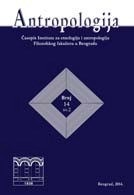Psychotherapy: Injecting Drug Users’ Cling to Normality. A Serbian Case
Psychotherapy: Injecting Drug Users’ Cling to Normality. A Serbian Case
Author(s): Bojan Žikić, Vladimira IlićSubject(s): Culture and social structure , Social psychology and group interaction, Clinical psychology, Substance abuse and addiction
Published by: Институт за етнологију и антропологију
Keywords: anthropology; normality (as social construct/cultural meaning); injecting drug users; psychotherapy; Serbia
Summary/Abstract: Psychotherapy is still more likely associated with mental disorders than with counselling in Serbia. Injecting drug users make a group whose members eagerly talk of being engaged in psychotherapy, contrary to the most of the other people who reluctantly reveal their visits to therapists. For this particular group of people psychotherapy operates as a tool of mental construction of the distinction between social and somatic illness. Injecting drug users are aware that the mainstream society looks upon them both as physically ill and as socially deviant, so in narratives about psychotherapy they tend to draw a line between their mental and physical appearance,suggesting that psychotherapy is their proof of being normal; physically damaged,yes, socially ostracised, also, but still sane and lucid. By doing this, they put strong accent on what they consider as emotional ability, i.e. that they are able to feel, express, and experience the same emotional charge in the same socially defined situations as the “normal” people do. This “triangulation” of psychotherapy as a means of self-explaining, mental model of being normal, and the place emotions play in such cognitive process in the injecting drug users’ narratives will make matter of our discussion. By displaying the explicit models of psychotherapy, normality and emotions in the cultural cognition of this group, we hope to point toward implicit models of these notions in Serbian culture.
Journal: Antropologija
- Issue Year: 17/2017
- Issue No: 3
- Page Range: 19-33
- Page Count: 15
- Language: English

